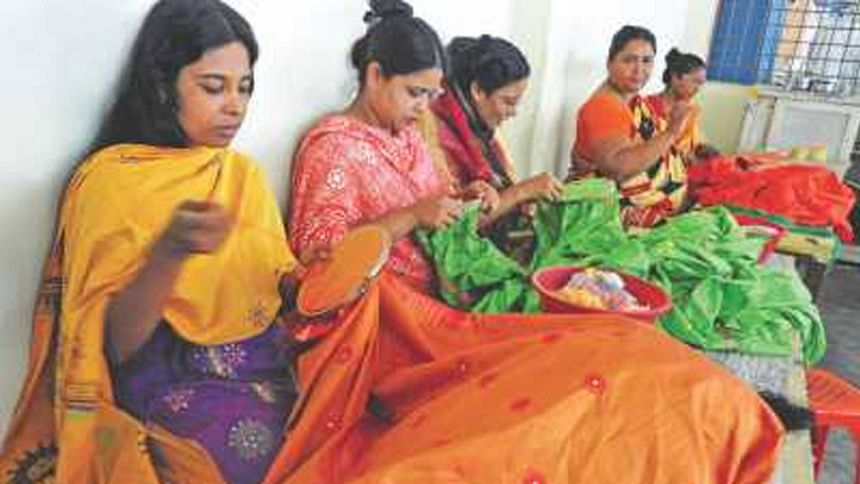Public-private partnerships bolster women-owned businesses in Bangladesh

Over the past several decades, Bangladeshi women have made tremendous strides forward simply by stepping out of their homes and participating more in the economy.
When it comes to owning a business, though, it has only been baby steps. Of the almost eight million businesses in Bangladesh, 99.93 percent of which are micro, small and medium enterprises, only 7.2 percent are women-owned and operated, according to the Asian Development Bank. Moreover, what little progress they have made has been largely undone by the Covid-19 pandemic. According to a BRAC survey, 65 percent of entrepreneurs reported having no income, 33 percent said that their businesses were not in operation during lockdown, and 86 percent stated that they could not take any measures to cope with business-related challenges.
Yet, despite the devastating economic effects of the pandemic, Bangladesh's GDP is still expected to grow by 5.8 percent in 2021. As robust as that sounds, there's a great deal more growth to be had. According to a McKinsey report, The Power of Parity: Advancing Women's Equality in Asia-Pacific, advancing women's equality in Bangladesh could achieve an eight percent increase over business-as-usual GDP. That would translate into an additional USD 30 billion.
Achieving it, however, won't be easy. That is because Bangladeshi women, like most of their counterparts throughout the developing world, are hindered by both long-standing and deep-seated cultural biases and gender disparity, as well as a lack of business readiness to connect and contract with large corporations.
No figure better captures this reality than the fact that, although nearly one-third of all private businesses in the world are owned by women, those same businesses earn less than one percent of what large corporate and government buyers spend.
The most promising avenue to realising the collective economic potential of Bangladeshi women is to redress gender gaps in corporate value chains and increase access to markets for women-owned businesses. Doing so will require a group effort between the private and public sectors (supported by NGOs) to facilitate gender-inclusive sourcing as a proactive supplier diversity and inclusion strategy.
One such project is Corporate Connect, a World Bank project funded by the Women Entrepreneurs Finance Initiative (We-Fi), which seeks to create sustainable market linkages between women-owned businesses and local and multinational corporations. In the first three phases, WEConnect International—a non-profit organisation that drives money into the hands of women business owners by enabling them to compete in the global marketplace—conducted ecosystem research to understand the procurement-related challenges of women-owned businesses and local corporate buyers in Bangladesh. This research then led to launching pilots for business readiness training for women-owned businesses, promoting gender inclusive sourcing programmes for local buyers, and making business connections between the two groups.
Building on the success of the previous phases, the Phase 4 activities started in March while the capacity building training for women business owners was launched at the end of June and is being implemented by WEConnect International and North South University.
WEConnect International's role will be to share business intelligence and train the women business owners on how to navigate the complexities of corporate value chains and also build a network to access new market opportunities. In addition to providing women business owners with skill-building tools (including business pitch preparation and negotiation training through a masterclass), WEConnect International will continue to work with local and regional corporations to influence the diversification of their value chains and connect them with Bangladeshi women-owned businesses.
For its part, North South University will contribute its decades of academic and practical experience through an in-depth supplier readiness training programme, including finance management, decision-making, leadership and HR management, and marketing and sales for those same women business owners.
So far, it's working. To date, an impressive 500 buyer-supplier connections have been made, 166 women business owners have been trained, 16 large corporations have signed the supplier diversity and inclusion pledge letter, and women-owned businesses have won 20 contracts through the matchmaking sessions.
Over the next three years of Phase 4, Corporate Connect will train over 700 women to become supplier-ready and help at least 40 large companies enhance their gender inclusive sourcing strategies.
It's a start, but unless we collectively push for urgent, significant change, it will be a long time before Bangladesh reaches the UN's Sustainable Development Goal 5 of gender equality. Still, it is a goal worth striving for, and one that drives the WEConnect International team every day, not only in Bangladesh, but in every country it serves.
Elizabeth A Vazquez is the CEO and Co-Founder of WEConnect International, a global network that connects women-owned businesses to qualified
buyers around the world.

 For all latest news, follow The Daily Star's Google News channel.
For all latest news, follow The Daily Star's Google News channel. 



Comments